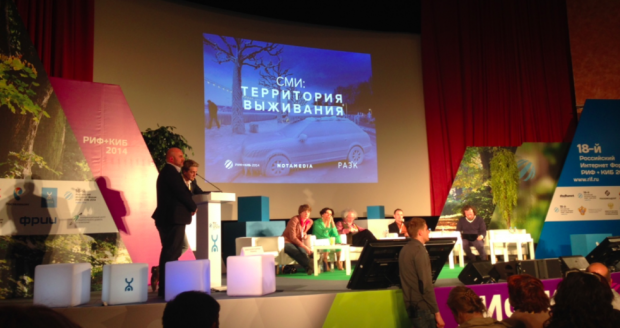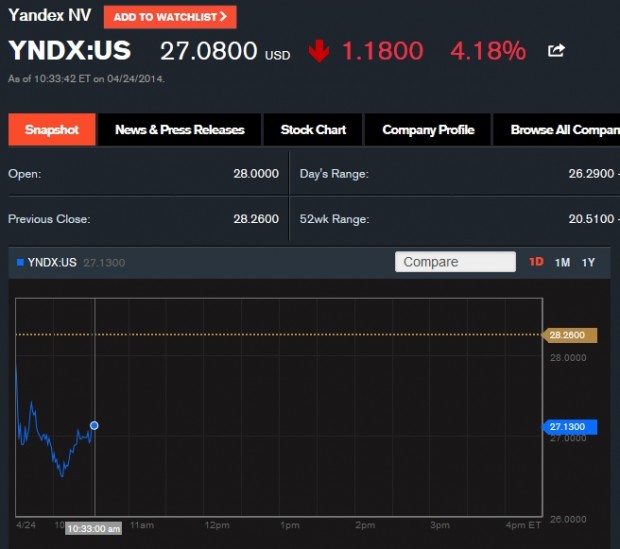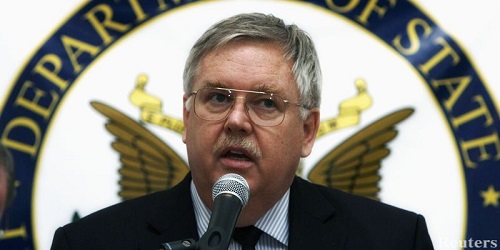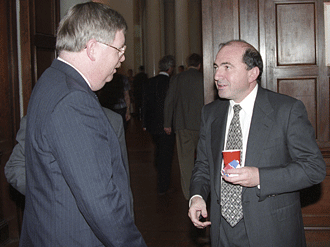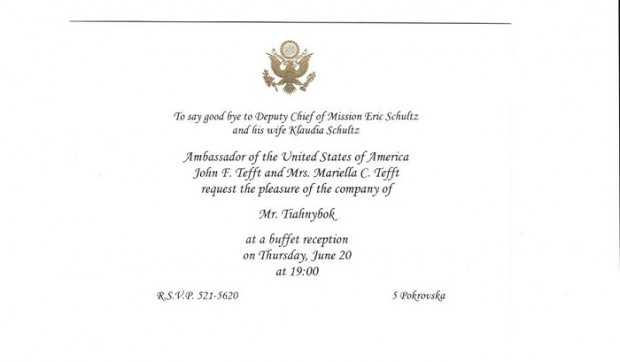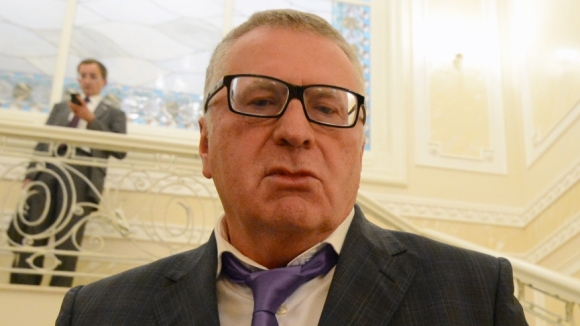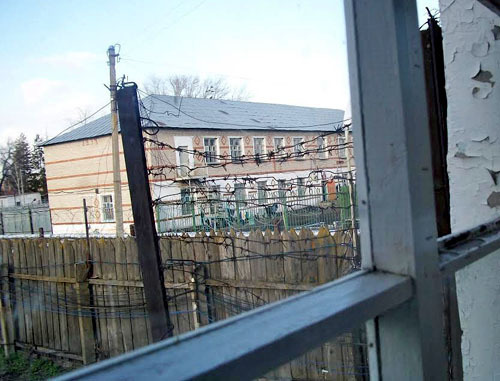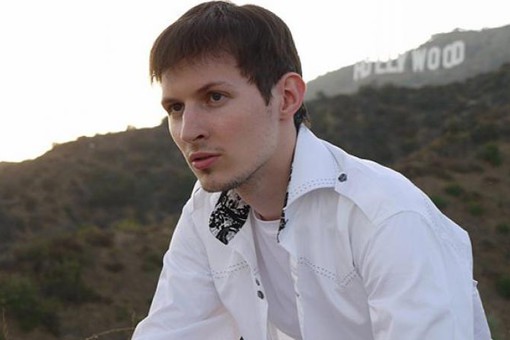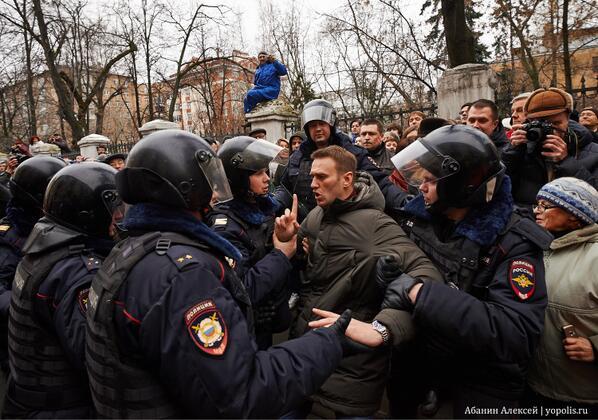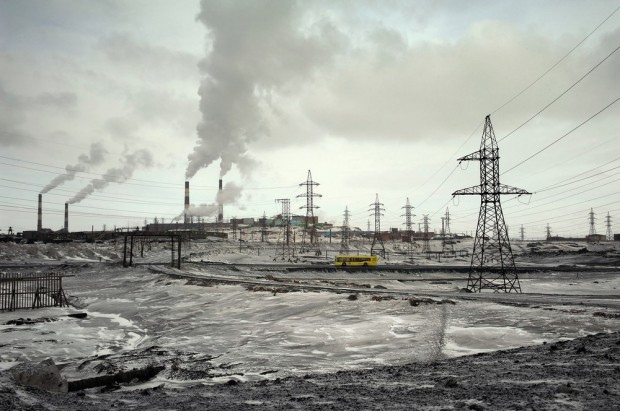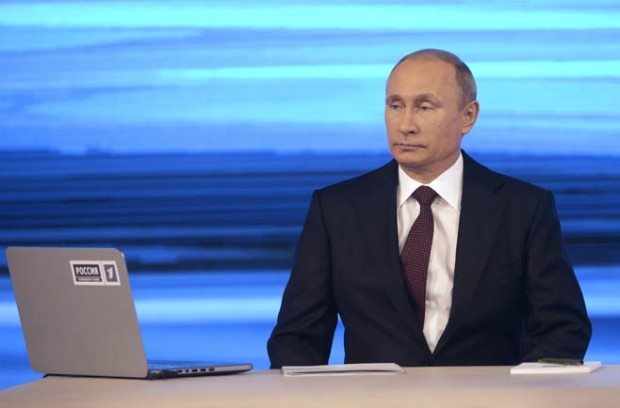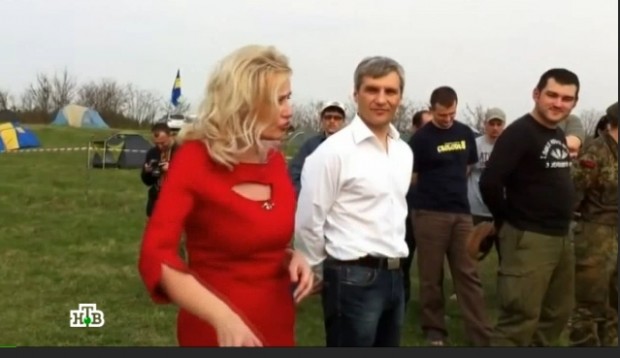Updated Daily. The Russian parliament has passed a number of laws designed to rein in an increasingly free and outspoken blogosphere, lately filled with criticism of Putin’s aggression in Ukraine. Legislators have passed a law mandating bloggers with more than 3,000 readers to register as mass media under the restrictive Russian press law. If dissenters think to move to Facebook or Twitter, another law is designed ultimately to control that exit by requiring foreign Internet services to place their servers with Russian user data on Russian soil. A major American investment fund has pulled out of Russia, and experts are revising upward their estimates of capital flight due to Putin’s forcible Crimean annexation and ongoing Russian hostilities in eastern Ukraine.
Go here, here, and here for past issues of our weekly. This blog will chart throughout the week what’s happening in Russia.
Please help The Interpreter to continue providing this valuable information service by making a donation towards our costs.
April 26, 2014
1540 GMT: Four American citizens have been expelled from Russia for teaching “American values,” News.ru and Buzzfeed reports:
“On April 24 and 25, employees of the Russian Federal Migration Service in the Chuvashia Republic detained 4 citizens of the United States of America, who arrived in the Russian Federation with the goal of tourism,” the statement reads. “During practically their whole time being in the city of Cheboksary they taught English to students of the foreign language faculty at the Chuvashsky government Yakovlev pedagogical university, propagandizing American values.”
One of the four had previously served in the US Peace Corps in 2001. The Russian government banned the Peace Corps in 2002 “in connection with carrying out intelligence and subversive activity,” said News.ru.
The four Americans, whose names were not provided, were brought before a court and each fined 2000 rubles (US $55) before being deported.
The Russians may have had a technical reason to expel the Americans because they were engaged in activity that was deemed “incompatible” with their tourist visa, and should have obtained a work visa issued by an approved Russian institution.
April 25, 2014
1540 GMT: RIA Novosti has run an interview with Alexey Venediktov of Ekho Moskvy, who continues to maintain that he received Snowden’s consent for the use of his name in a journalism award:
“A journalism prize named for Edward Snowden will appear in Russia; the former CIA agent personally gave his consent for the use of his name on the prize, and it is possible he will become a member of the jury, Alexey Venediktorv, editor of the radio station Ekho Moscow told RIA Novosti.
‘I was one of those people who believes that the Internet media prize should have existed long ago. There are a mass of prizes, but not a prize specifically for Internet media…I got an idea in my head, that even with all the controversy regarding the views of Edward Snowden, he is doing a lot for openness of information, which is very important for Internet media. My colleagues got in touch with Snowden, and received his agreement for the use of his name on the prize,’ said Venediktov, the chairman of the Internet media commission of the Russian Association of Electronic Communications, which organized the award.
Moreover, according to Venediktov the organizers of the prize would like Snowden to become a member of the jury for the awards. ‘We would like him to become a member of the awards jury. But since he doesn’t speak Russian, this will be very hard. Although we have not lost hope, we will propose this to him,” said a source.
This interview clarifies the interchanges yesterday, where Venediktov openly asked his assistant if consent was received, and his colleague said yes. Other Twitter users were scornful of the idea of having Snowden’s name on an award for Internet journalism.”
1510 GMT: Ben Wizner of the American Civil Liberties Union (ACLU), a legal advisor for fugitive former NSA contractor Edward Snowden, says that Snowden did not authorize the use of his name in the journalism awards announced yesterday.
Alleged Russian media award named after Snowden is a hoax. He knows nothing about it and certainly has not given permission to use his name.
— Ben Wizner (@benwizner) April 25, 2014
But Ekho Moskvy’s editor-in-chief Alexey Venediktov reported yesterday that Snowden had been contacted and given his consent (see the translation of his tweets and the report by The Interpreter).
Wizner is digging in and saying Snowden was “out of the loop,” yet as we reported yesterday, Sergei Plugotarenko of the Russian Association for Electronic Communications announced the prizes yesterday at the Russian Internet Forum 2014, and used Snowden’s name. We sent queries to Plugotarenko, but haven’t heard back yet. Meanwhile, he is continuing to report on his announcement of the Snowden Awards:
Photo: Так вчера я представил новую премию имени г-на Сноудена: Internet Media Awards 😉 (at риф+киб 2014) http://t.co/hise6OIU8V
— PLUGOTARENKO Serge (@plugotarenko) April 25, 2014
Translation: @plugotarenko Here’s how I presented the new awards yesterday named for Mr. Snowden: Internet Media Awards; ) (at RIF+KUB2014).
Max Seddon of Buzzfeed has continued to ask Wizner questions, and Wizner answers evasively:
@benwizner Did Snowden tell you that? @aavst says you guys are out of the loop and that he did indeed give permission…
— max seddon (@maxseddon) April 25, 2014
@benwizner Did Snowden tell you that? @aavst says you guys are out of the loop and that he did indeed give permission…
— max seddon (@maxseddon) April 25, 2014
@maxseddon @aavst Snowden is out of the loop? That's a good one.
— Ben Wizner (@benwizner) April 25, 2014
@benwizner @aavst he told one of you it was false and another that it was true, then?
— max seddon (@maxseddon) April 25, 2014
@maxseddon @aavst He told no one that it was true.
— Ben Wizner (@benwizner) April 25, 2014
However this story turns out — whether Snowden didn’t keep his American supporters in the loop or whether Russian Internet professionals didn’t really reach Snowden somehow (but one of his minders?), this episode is a reminder for us of an interesting and troubling phenomenon: Snowden himself never communicates directly on social media like Twitter, and is never able to be reached by just any reporter, but only a small circle of trusted “adversarial journalists,” as Glenn Greenwald, who broke the story of Snowden’s leaked documents, terms them.
Are Russian reporters, either controlled by the Kremlin or under increasing state pressure, going to be able to reach Snowden directly now? The episode over the naming of the prize is the first indication.
While Snowden has given lengthy interviews to sympathetic reporters from Germany’s ARD or Vanity Fair, by and large his communications have been released by his handlers at WikiLeaks or a few select journalists in the West. No Russian journalist has ever gotten an interview with him. To be sure, the first reports of him emerged from the notorious Russian provocateur and antisemite Israel Shamir of Komsomolskaya Pravda, a collaborator of WikiLeaks. But independent Russian media, let alone mainstream state media, have not been allowed near him.
When Snowden met human rights advocates and lawyers at Moscow’s Sheremetyevo Airport last year, no press was allowed; a few of the lawyers gave a press conference afterward. Snowden’s first appearance in the Russian media outside of a few snapshots taken of him evidently without his knowledge by LifeNews, a tabloid TV said to be connected to Russian intelligence agencies, was last week during Putin’s call-in show, where he asked the Russian leader some softball questions about whether Russian maintains mass surveillance over Russian citizens, and Putin answered in generalities and evasions.
April 24, 2014
1650 GMT: Russian journalists were surprised and some openly scornful when this morning at a conference about the Russian Internet, new journalism awards named for Edward Snowden were announced.
Ekho Moskvy confirmed by evening that indeed Sergei Plugotarenko, the head of the Russian Association of Electronic Communications (RAEK), a non-profit organization devoted to “a civilized market of electronic communications” announced the creation of the Edward Snowden Internet Media Awards named for the fugitive former American NSA contractor. The announcement was made during a press conference at the RIF+KIB[Russian Internet Forum 2014].
Andrei Venediktov, editor-in-chief of Ekho Moskvy, the only independent radio station in Russia, under a lot of pressure with a new general manager close to the Kremlin spokesman Dmitry Peskov, expressed some skepticism and joked about them with his assistant:
Сертифицирую, что Леся @gdekak получила от Сноудена согласие на использование его имени в названии ИнтернетМедиаПремии. Ее надо опасаться…
— Alexey Venediktov (@aavst) April 24, 2014
Translation: @aavst I certify that Lesya @gdekak received consent from Snowden to use his name in the title of the Internet Media Award. Should be wary….
“@gdekak: @aavst а я акцептирую!) ахаха” :-))
— Alexey Venediktov (@aavst) April 24, 2014
Translation: @aavst @gdekak “and I accept! hahahah : – ))
Чтобы вы поняли, Эдвард Сноуден лично одобрил создание премии. Он в курсе. Сегодня утром дал согласие 🙂 #риф2014
— Леся Рябцева (@gdekak) April 24, 2014
Translation: @gdekak So that you understand, Edward Snowden personally approved the creation of the prize. He is informed. This morning he gave his consent : ) #риф2014
Then @Sandy_mustache, a parody account of Kremlin spokesman Dmitry Peskov [“Peskov” comes from the word for “sand” in Russian–The Interpreter], commented on the news, referencing Putin’s recent forcible annexation of Ukrainian territory:
Эдвард Сноуден уже говорит "Крым наш" без акцента.
— Усы Пескова (@Sandy_mustache) April 24, 2014
Translation: @sandy_mustache Edward Snowden already says “Crimea is Ours” without an accent.
And responses ran the gamut of Russian attitudes toward the Snowden affair:
@Sandy_mustache Главный разоблачитель Edward Joseph Snowden разоблачил, что он не является разоблачителем.
— Alexander (@umbatumba) April 24, 2014
Translation: @umbatumba The chief exposer of Edward Joseph Snowden has exposed that he is not an exposer.
@Sandy_mustache если зайца много бить- можно научить курить
— Alexander Orlov (@_orl_) April 24, 2014
Translation: @_orl_ if you really beat a hare, it learns to smoke most anywhere.
@Sandy_mustache -результат хорошей работы педагога с электрошокером.
— Ra_Circus (@Ra_Circus) April 24, 2014
Translation: @Ra_Circus – the result of good work of the teacher with an electrical prod.
The prize has paradoxically been announced at a time when a number of web sites have been blocked by the state censor at the request of prosecutors, when some sites have lost their independent editors and journalists, when Pavel Durov, the founder of Russia’s largest social network, announced this week that he had emigrated from Russia because it was “impossible to do business” under the current climate of repression, and when laws have been passed mandating foreign Internet companies to place their servers with Russian user data on Russian territory, and reining in bloggers.
Владимир Владимирович пока не определился, что раньше: закрывать СМИ, затем давать премию Сноудена, или наоборот.
— Усы Пескова (@Sandy_mustache) April 24, 2014
Translation: @sandy_mustache Vladimir Vladimirovich [Putin] hasn’t determined what to do first: close the media, and then give the Snowden prize, or the opposite.
@aavst @gdekak если ЦРУ создало интернет ,то премия Сноудена вполне логичное продолжение.
— Victor Khodorovskiy (@vickhod) April 24, 2014
Translation: @vickhod @aavst @gdekak if the CIA created the Internet, then the Snowden prize is quite a logical continuation.
According to The Runet, “The new prize will be devoted to professionalism of journalists,” Plugatorenko said at a press conference, where an unwitting bit of irony was supplied by a large sign on a screen behind the speaker with the phrase “MEDIA: TERRITORY OF SURVIVAL”.
There will be two categories, achievements of an individual journalists and the achievements of a project (publication). Applications will be accepted starting in May, and the winners are planned to be announced in September.
The Runet says that since 2004, there has already been a Runet award, founded by the Russian Federation Federal Agency for Press and Mass Communications.
The new Snowden prizes are hardly likely to go to any investigative journalists or those reporting on the crackdown on the Internet itself, but it will be curious to see if it goes to the most cynical state hacks. Some have already begun vying for the prize; Margarita Simonyan, editor-in-chief of the Kremlin’s propaganda outlet RT.com turned in this tweet today as Russian troops and armored vehicles amassed at the Ukrainian border.
Украина. R.I.P.
— Маргарита Симоньян (@M_Simonyan) April 24, 2014
Translation: @m_simonyan Ukraine, R.I.P.
1446 GMT: In response to a call for foreign Internet providers to place their servers on Russian territory, Arkady Volozh the general director of Yandex, the Russian search engine, said in an interview with Forbes that it is connecting its future with the “export of technologies” due to the current climate for Internet business in Russia:
“Not only the profitability has fallen, but the risks have grown. In recent years, for example, no, but recently, yes, why hide it here.”
Yandex’s stock fell by 4.10% after a speech by President Putin claimed the Russian search engine was under Western pressure at Mediaforum in St. Petersburg, Bloomberg reported, and is now at $27.00.
“As soon as they began to work, they were also pressured: they had to have a certain number of Americans in their company, a certain number of Europeans, and they were forced to agree with that. This is a national system, however part of their registration is abroad, not only for the purposes of taxation, but for other considerations.”
As we reported earlier this week, Pavel Durov, founder of Russia’s largest social network VKontatke, left Russia and said it was “impossible to do business” there. Meanwhile, the Russian parliament has passed a number of laws restricting the Internet that await Putin’s willing signature — an imperative to locate servers with Russian users’ data on Russian soil and a requirement that all bloggers with more than 3,000 readers register as mass media outlets, which puts them under further press restrictions.
1431 GMT: President Vladimir Putin said the servers of the major Internet services must be placed on Russian soil to protect Russian users’ information, vesti.ru and ITAR-TASS reported. Speaking at the conference Mediaforum in St. Petersburg, Putin said, “This is possible, and necessary to do but it requires time and capital investments.” Currently, most of the flow of data passes through servers in the US “where everything is controlled,” he said:
“The Internet emerged as a special project of the CIA USA, and continues to be developed as such,” said Putin. Moreover, the president noted that the national search engine Yandex and the social network VKontakte are trying to develop business, mathematical and informational programming in Russia. “Our companies didn’t have resources free for such capital investments, but now they have appeared,” said the head of state. Putin expressed the hope that the Russian Internet would develop rather intensively and rapidly and will secure the interests of the Russian Federation.”
The Internet was in fact first developed by the US Department of Defense, which awarded the first contracts for the Internet’s progenitor ARPANET in the 1960s. The first message over ARPANET was sent from the University of California in Los Angeles (UCLA).
April 23, 2014
1854 GMT: A showing of the film “Children 404” about gay teens in Russia was interrupted by conservative protesters, Russian blogger Oleg Kashin reports:
Показ фильма "Дети 404", который Сolta проводит сегодня на Артплей, прерван православными активистами и полицией. Зал оцеплен.
— Kashin⚓Kashin⚓Kashin (@KSHN) April 23, 2014
Translation: @KSHN A showing of the film “Children of 404” which Colta is holding today at Artplay was interrupted by Russian Orthodox activists and the police. The theater was roped off.
Ekho Moskvy reports that police and volunteers in St. George ribbons (used by Russian nationalists in both Russia and Ukraine) came and checked the documents of everyone who was at the “indecent” film.
Under Russian law, promotion of gay lifestyles — very broadly understood — among children and teens is banned by law.
1750 GMT: Amb. John Tefft, reported to be Obama’s nominee for ambassador to Moscow, has not been formerly nominated by the White House let alone confirmed by Congress, yet we already have an early warning of how he might be viewed by Russians. A popular-if-controversial blogger, Oleg Lurie has done a hit job on him in his LiveBlog journal, already widely reprinted in Russian social media.
Lurie writes about the “surprising stories” he has found regarding John Tefft, whom he describes as “a lover of expensive antiques, gay parades, and oppositions, a long-time and faithful friend of Mikheil Saakashvili and Boris Berezovsky.” Lurie also claims Tefft is supposedly “the conductor of all kinds of color revolutions, including the Georgian and Ukrainian.” A career foreign service officer, Tefft has served as US ambassador to Georgia, Ukraine and Lithuania.
Picking up the theme of other lurid anti-opposition propaganda, Lurie says “There will be cookies for the opposition! Tasty.” And unlike past ambassadors, including Michael McFaul, says Lurie, who supported the opposition but didn’t have funds, Tefft “openly announced his readiness for the ‘development of civil society’ according to American gimmicks.” His wife, too, is implicated in “aiding the opposition” because she worked at USAID.
Lurie claims to have caught Tefft in a “slip” admitting such direct assistance in a speech, but in fact he is merely speaking of the standard aid packages that the US government provides all developing countries which do not involve direct aid to political parties or radical movements. Russia expelled USAID in 2012, but reserves for itself the right to fund the Kremlin’s RT.com propaganda programming for America and such projects as the government-controlled Russian Institute for Democracy and Cooperation in New York.
Lurie also picks up another popular theme of Putin and his chorus, ridiculing the West’s advocacy for gay rights — Tefft did make a statement once, in keeping with Obama Administration policy, welcoming Kiev’s first gay parade and calling for respect of LGBT rights. Tefft is also scored for urging the release from prison of former Ukrainian prime minister Yuliya Tymoshenko, whose case was widely viewed as politicized in the West.
Yet Tefft’s worst “sins” in “fomenting revolution” are his contact with former Georgian President Mikail Saakashvili, who awarded Tefft with the Order of St. George, and also an apparent encounter with the late Russian oligarch Boris Berezovsky at a reception. The picture is only available on Russian blogs, and it is not clear when and where the reception took place. Tefft authorized the classification of a critical cable on Berezovsky and his business dealings with Badri Patarkatsishvili, later published by WikiLeaks. Of course, greeting all kinds of political figures of various stripes in the post-Soviet space would be a function of Amb. Tefft’s job.
Lurie also publishes an invitation sent to Ukrainian politician Oleh Tyahnybok, leader of the nationalist Svoboda party, to imply that the US supports radicals in the Kiev government — a persistent theme of the Putin government, despite the reality that Svoboda and Right Sector consistently poll in the low single digits in Ukraine.
Lurie also cites a Ukrainian press report that about a memo from Tefft supposedly published by WikiLeaks which has him criticizing the Ukrainian national anthem, a claim which couldn’t be verified, and whose original link is now removed.
Lurie is famous for publishing an article in Novaya Gazeta in 2001 exposing Russian money-laundering in the Bank of New York, which led to threats of a crippling libel suit. Subsequently, Lurie was implicated in a blackmail case related to Russian senator Vladimir Slutsker, wound up serving 4 years in prison, and was released in 2011. Since then he has continued to find himself in controversies, recently with Crimean war coverage.
1440 GMT: The flamboyant Russian parliamentarian Vladimir Zhirinovsky has apologized to the journalists of Rossiya Segodnya during a live talk show with Vladimir Solovyov on the TV channel Rossiya 1, RIA Novosti reported. On Good Friday (18 April), the ultranationalist politician shocked reporters when he pushed his bodyguards on women journalists at a press conference, urging them to rape them, all the while shouting, “Christ Has Risen!” Among them was a pregnant reporter, Stella Dubovitskaya.
Solovyov gave Zhirinovsky the opportunity to apologize “as the disturber of the peace in recent days,” but his response was muted:
“On Friday at the Duma in talking with the press, at the end, answering questions, I spoke a little crudely, responding to a girl. I didn’t even see her at first, and it turned out that she was in the family way, pregnant. I apologize to her and in general to everyone, if I offended someone. Old age should conceal any emotions with wisdom. We always try to restrain them, so that people do not get offended at us.”
After it was reported that the journalist was hospitalized after the incident, he said he was prepared to pay her medical bills.
Zhirinovsky is unbowed in his provocative activities, however. Yesterday he announced that he was preparing a draft law to submit to the Duma which required that both plaintiff and respondent must be present at judicial proceedings in cases involving the “defense of honor and dignity” under Russian law, Izvestiya reported. As it happens, Zhirinovsky may soon be a respondent himself in such a case — the journalists from Rossiya Segodnya have indicated that they plan to sue him for his insult of Dubovitskaya at the Good Friday press conference.
The draft law is co-authored by three other deputies from Zhirinovsky’s ill-named Liberal Democratic Party of Russia — Alexei Didenko, Yaroslav Nilov and Mikhali Degtyarev. Current law makes it possible for either party in “honor” suits to be excused from proceedings at the judge’s discretion for various reasons, including incapacity or military service. This has led to cases where neither party shows up, especially if they are celebrities; most of the lawsuits involve demands for monetary compensation, not apologies for the record.
Yury Bogomolov at colta.ru asked what should be done about Zhirinovsky. In a lengthy article analyzing his antics, he never mentions the common explanation that Zhirinovsky is a provocateur who collaborated with the KGB, known from credible past revelations by Russian politicians, but decides that his changing views over the years are now exploited by the government to serve as a collective symbol for Putin’s electorate, and his outbursts are calculated to channel the views of “the Russian street.”
1410 GMT: Yevgeny Vitishko, the Krasnodar environmentalist who had protested about ecological damage from the Sochi Olympics construction, is currently serving his term in the town of Sadovy in the Tambov Region, Caucasian Knot reports. Vitishko was sentenced during the Sochi Olympics to three years of prison for property damage after he removed part of a fence and wrote some graffiti. Supporters believe his punishment during the Games was meant to serve as a deterrence to other environmental protesters.
Recently, colleagues became concerned when Vitishko did not answer a scheduled weekly call and went to visit him in the labor colony. But he was not in a punishment cell as rumored, it was just that the colony wardens had temporarily suspended phone privileges after three convicts escaped.
Meanwhile, the Ministry of Justice in the Republic of Adygea has suspended the activities of his organization for six months, pending inspection of charges of legal violations for failing to supply required documents.
Russia's Ministry of Justice has suspended work of Ecological Watch in North Caucasus following previous persecution of its members
— o.chelysheva (@ochelysheva) April 23, 2014
1352 GMT: Russian parliamentarians have passed in the third [final] reading a law equating popular bloggers in social networks with mass media, gazeta.ru reported. Any blogger who has more than 3,000 readers will have to register as a media outlet and follow Russia’s restrictive press law, which includes regulations on elections, prohibitions on disseminating “extremist” materials, and identification of audience age.
Russia’s very lively blogosphere has been roiling for weeks in anticipation of the law, with people bewildered as to how they will define the “3,000 readers” rule. Last week, the Russian search engine Yandex.ru announced that it was pulling its ranking system and badges with audience counters, evidently to avoid having to address the question of defining traffic for blogs. Yandex explained the removal as motivated by the need to clean up outdated systems and the increase in the use of social media links instead of search to find blogs. To be sure, this is a trend all over the Internet in many countries, and hit counters have been made obsolete with other means of measuring readership, but Yandex may simply want to avoid having to serve as a punitive arm of the government — for the sake of its own survival. Yandex has been critical of legislation to control the Internet.
Roskomnadzor, the state agency that monitors communications and essentially serves as a censor, plans to start a special blog register, and for those who fail to register and comply with the law, fines up to 300,000 rubles ($8,400) and 500,000 ($14,000) for repeat offenders will be imposed.
Sofya Ivanova, PR director for Rambler&Co, owners of LiveJournal told gazeta.ru her company was pushing back against the legislative action:
“LiveJournal, Inc. believes that the industry does not need any additional regulation, since all the points that are provided in the new law are reflected already in legislation; that is the law on libel, the rules for election campaigning and the rules banning distribution of extremist information. All of these norms are already in effect.”
Bloggers have not yet received any government guidance on how to count their readers, and the threat of more scrutiny under vaguely-worded laws like the ban on “extremism” is likely to drive bloggers to services outside Russia, Yelena Bordyugova, a marketer for the company Blogun, told gazeta.ru.
April 22, 2014
2043 GMT: For months, Russian law-makers have been threatening to force foreign Internet services to store Russian user data on servers on Russian soil — now tonight comes news that they’re making good on it with a package of legislation, lenta.ru reports:
“Foreign Internet services of electronic mail and the exchange of instant messages will be obliged along with Russian companies to ensure storage of data about user activity for a period of half a year, and obliged to keep it on Russian territory. This follows form the text of an “anti-terrorist package” of laws which the State Duma has passed Tuesday in the third [final] reading. In the evaluation of experts, if foreign companies refuse to comply with this law, access to their services in Russia will be blocked.”
The move to make a Russian “sovereign Internet” spoken of by Putin repeatedly for some time comes as an amendment to the already-restrictive Law on Information, Information Technologies and the Protection of Information. The language is unmistakeable: Internet companies must place servers on Russian territory where they are to keep all user communications for half a year.
That means to keep from being blocked in Russia, the US company Facebook, for example — which has Russian investors itself — would have to lease server facilities in Russia where Russians’ data will be kept — which means inevitably that all their interchanges with those abroad will also be available to the Russian intelligence agencies who already have access to Russian services.
Interestingly, the new law apparently relieves certain licensed Russian communications operators including Internet providers and state media, from having to meet these requirements of storage, presumably because they are already under control and have to provide it on demand anyway. But that still means that Internet service providers, electronic mail providers, messenger services, smart phones and social networks will have to comply with the storage requirements.
Ultimately, Google, with includes Gmail and YouTube, Facebook, Microsoft, owner of Skype will have to comply with the law to operate in Russia, says lenta.ru.
#Russia says all foreign Internet companies have to turn over data on their users or be banned in the country. What say you, Edward Snowden?
— Julia Ioffe (@juliaioffe) April 22, 2014
Lenta.ru discusses how the law will be difficult for Russian authorities to enforce, given that foreign companies are registered and operate outside the country. The only way to enforce full compliance will be to block the services until the companies move user account data to Russian servers. Even so, corporate law expert Konstantin Trapaidze believes that it will be hard for Russian officials to use legal methods to force the international companies to meet their methods, yet Russia will not want to openly isolate itself by shutting down access completely.
Google, Facebook and Microsoft did not have any comment for Lenta.ru, and they aren’t making any statements anywhere, perhaps in the hopes of negotiating away the challenge. Rambler said it would comply with the law once it was passed by the parliament and signed into law by the Russian government. Mail.Ru Group, which now has the majority ownership of VKontakte, the Russian social network whose founder just emigrated from Russia, had no comment. There was some pushback from Yandex.ru, the Russian search engine:
“In our opinion, the passage of the law is yet another step toward the strengthening of government control over the Internet in Russia, which will negative effect the development of the industry.”
So remember those warnings Russia was going after the Internet/social media? http://t.co/3vsH1kADkl
— Miriam Elder (@MiriamElder) April 21, 2014
To put it another way, you can kiss the independence of VKontakte (Russian Facebook) goodbye: http://t.co/3vsH1kADkl
— Miriam Elder (@MiriamElder) April 21, 2014
1614 GMT: UCP, the minority (48%) investment company in the Russian social network VKontakte, is claiming that a business dispute over withdrawal of funds rather than political pressure from the government is at stake in the departure of entrepreneur Pavel Durov from the company and from Russia. In fact, sources in UCP told gazeta.ru that they were not happy with is abrupt departure:
“As is known, we don’t have particularly affection for Pavel Durov, but we consider it absolutely necessary to observe the lawful procedures in corporate actions of such importance. The issue of the general director of VK will be reviewed at the next board of directors’ meeting.”
UCP has had difficult relations with Durov, writes gazeta.ru, although the investment fund reportedly did not give its consent to fire him, as it realized his importance to the social network. Nevertheless, investors were unhappy with him:
“People at UCP believe that Durov politicizes the situation and presents himself as a ‘martyr,’ when in fact he is in a difficult situation due to the lawsuit filed against him for spending the company’s money.”
Durov reported that the funds were used for development of Telegram, an encrypted mobile communications program, which he hopes to turn into a social network of mobile users. Shareholders complained that Durov had used VKontakte resources for his own project.
1604 GMT: Pavel Durov has emigrated from Russia and “is not planning on returning,” gazeta.ru reported.
The founder of the popular Russian social network VKontakte announced last week that he refused to meet demands of Russian authorities to turn over user data from the VK groups of opposition leader Alexey Navalny and the Ukrainian protest movement EuroMaidan and close them down.
Durov has left before for long periods to work on other projects, but this time his statement to the Russian media is more adamant, as he says it is impossible to do business in Russia:
“I am afraid that there is no road back any more. I have refused to cooperate with the authorities. They dislike me.”
Russian intelligence likely already had access to the data anyway given its considerable ability to filter communications under both law and practice. But Durov’s refusal was a symbolic bid to claim autonomy for the servers of private companies in Russia that many see as vital for the future prosperity and freedom of the Internet, but which is now in jeopardy.
Here is a full translation by The Interpreter of the statement Durov posted on his VKontakte page yesterday:
“Judging from the news, as a result of my public refusal last week, today I have been fired from the post of general director of VKontakte. It is interesting that the shareholders did not have the courage to do that directly and I learned about my mysterious firing from the press.
As it has been reported, the board of directors of VK today *suddenly* discovered that the recall of my statement of departure from the post of general director 3 April (which they had publicly accepted before that) turned out to have been formulated ‘not according to all the rules,’ and therefore I was automatically relieved of my position. As far as I understand, this non-transparent position is a common one for all the shareholders.
Thus, today, VKontakte is transferred to the complete control of Igor Sechin and Alisher Usmanov. Likely, under Russian conditions something like this was inevitable, but I am happy that we lasted 7 and a half years. We achieved a lot. And part of what was done cannot be turned back.”
Durov at first left the company on 1 April, then returned saying it was a joke, while remaining in a lawsuit over the issue of a new product, Telegram, encrypted mobile communications software which his former partners said he developed using VKontakte resources. By that time, Durov had essentially bowed to pressure to sell his shares to pro-Kremlin oligarchs.
In December 2013, Durov sold his remaining shares (12%) to Ivan Tavrin, general director of Megafon, who in turn sold his shares to another VK shareholder, Mail.ru Group, which then enabled Mail.ru (Alisher Usmanov) to own 51.99% of the company, gazeta.ru reported. The other investor is Ilya Shcherbovich of the investment fund UCP, who owns 48%. Charges have been made that UCP acquired its shares unlawfully from the two VKontakte founders; UCP has countered by complaining about the development of Telegram and accused Durov of unlawful withdrawal of funds from the company. Shcherbovich has now sued Durov and Mail.ru; Mail.ru is now trying to dispute UCP as a shareholder.
1454 GMT: A major Russian pipeline project to Europe has been significantly challenged, but it’s not clear if it’s over yet. Bulgarian Economy and energy Minister Dragomir Stoynev said today, “We will fight for the implementation of South Stream” despite a resolution from the European Parliament voting against its constructions and calling for further EU measures against Russian firms.
Today Russia’s state monopoly Gazprom announced the purchase of 50% of South Stream’s shares from its own Berlin-based subsidiary Gazprom Germania in the Dutch-based South Stream Transport, thebricspost.com reported.
South Stream Transport is an international joint venture of Gazprom, Italy’s ENI, France’s EDF and Germany’s Wintershall Holding to build a 2,400-kilometer pipeline across the Black Sea to reach Bulgaria and other EU members.
The question still remains as to whether Gennady Timchenko of Russia’s Stroitransgaz, included in the US but not EU sanctions list against Putin over the forcible annexation of the Crimea, will go ahead to win a $4.82 billion deal to build part of South Stream; he owns 63% of Stroigas. Some observers have speculated that the project is now “dead,” and that the Italian oil major ENI, a key shareholder, has second thoughts, and Timchenko’s status as winner of the tender is not confirmed.
But last month a contract was signed to build the first of four marine lines with the Italian company Saipem, RIA Novosti reported, and Russia’s Energy Minister Alexander Novak said last week consultations are continuing with the EU.
1404 GMT: Moscow’s Babushkinsky District Court has found opposition leader and anti-corruption blogger Alexey Navalny guilty of libel today, RFE/RL reported. Ruling party United Russia deputy Alexey Lisovenko sued him for libel for a tweet calling Lisovenko “a drug addict.”
Navalny was fined 300,000 rubles or $8,350.
Lisovekno earlier complained that Navalny was violating the terms of his house arrest by having posts under his name appear on LiveJournal, Twitter and other social media. Navalny says his wife and colleagues from the Anti-Corruption Foundation are making contributions for him.
Navalny is already serving a sentence of house arrest for taking part in an unauthorized demonstration against the prosecution of the Bolotnaya Square defendants and had a five-year suspended sentence for charges related to a lumber deal which his lawyers challenged as politically-motivated.
And soon he will address yet another case trumped up by authorities in retaliation for his exposes of corruption among high officials, a claim that he and his brother embezzled funds from a French firm, Yves Roches, which in fact has made a statement that it has suffered no damages, says Navalny’s supporters on a blog set up for his defense.
Navalny has been a constant target of state media attempts to smear him as a “fifth columnist”; recently state TV featured a broadcast of his wiretapped phone calls and clandestine videotapes of his meetings with foreigners in an attempt to frame him; a large banner appeared in publicly condemning him and others; a crude video appeared on YouTube claiming falsely he and other opposition figures were in the pay of the CIA and directed by former US ambassador Michael McFaul; his detractors claimed erroneously that an op-ed piece he did urging sanctions against corrupt cronies of Putin’s was somehow the impetus for US sanctions’ list; state media claimed he was “mentally ill” based on an attempt by lawyers to defend him on grounds of mental stress in another libel case he lost to Konstantin Kostin and false charges that he had property abroad or a fancy apartment undisclosed in his election campaign.
Navalny’s recent efforts to register a newspaper failed although his Party of Progress was registered by the Ministry of Justice, even if its candidates were not accepted for participation in the Moscow municipal elections in September 2014. Navalny, criticized by liberals for his implicit support of Russian ultranationalists was able to get about 30% of the vote in the Moscow mayoral elections, but narrowly lost to Putin’s preferred candidate, Mayor Sergei Sobyanin.
0540 GMT: Take some time to check out the fascinating photos of Elena Chernyshova of Norilsk, a remote outpost of Soviet metals industry. Life is austere in this harsh location where sunlight is nearly absent in the winter and incessant in the summer. People have little access to the outside world, and have to make do with a crumbling infrastructure, lack of both necessities and entertainment, and an increasingly polluted environment:
“According to the Blacksmith Institute, Norilsk is the 7th most polluted city in the word and most polluted in Russia. Every year the metallurgical combine emits almost 2 millions of tons of gas into the atmosphere. One of them, sulfur dioxide, is a principal source of acid rain. Almost 100,000 ha of the fragile tundra around the city is dead or in danger.”
0530 GMT: Moscow Times is speculating on a possible reprieve for Russia’s last independent TV station, TV Rain, based on a comment President Vladimir Putin made on his call-in show last week:
“‘If the disappearance of Dozhd from television screens is a result of some kind of checks and excessive attention on the part of the regulatory organs, then for my part I will do everything to counteract that attention,’ Putin said.”
TV Rain has been fighting for its life ever since a controversial survey about whether the sacrifices of the Leningrad Blockade in World War II were justified triggered a backlash from war veterans, followed by cancellation of the channel by several cable operators. TV Rain launched a fund-raising marathon where producers managed to raise enough to survive for another three months, but meanwhile were unexpectedly informed that their lease at the trendy Krasny Oktyabr (Red October) building would not be renewed.
While Putin’s comment may serve as a political signal, it’s not clear what it amounts to. First, it may turn out that Roskomnadzor, the state censor, will be found to have done its job, and not be guilty of ‘excess” — it’s rare for a government agency fulfilling the president’s will in reining in independent media to be found guilty of anything.
Second, even if the state regulators are found to be overdoing it, it may suit Putin to appear the liberal and then let nature take its course as the problems with finding rental space and dealing with unhappy cable operators could prove too much.
There’s been a tendency by anti-opposition cynics as well as increasingly controlled media to portray TV Rain’s problems as only related to business decisions, as ITAR-TASS indicates:
“Shortly after Putin’s statement, on Friday [18 April] the Russian Association of Cable Operators announced their willingness to aid Dozhd [Rain] in conducting negotiations with cable operators in order to put the channel back on the air, stating as a condition that Dozhd would have to deal with all cable operators on equal terms.
“They should decide for themselves what commercial model they are working on — they can not work with one operator on one model, with another operator on a second model, and a third for another operator,” association head Yury Pripachkin said, Itar-Tass reported.”
Yet the problems of pricing models plague the cable industry in the US as well; the issue isn’t just the TV station’s problem alone — and government regulation of pricing is a factor as well.
TV Rain’s chief Natalya Sineyeva has said that while the channel may be forced to close, she intended to change the business strategy and pursue online TV streaming.
Whether or not any of this will help remains to be seen; Sineyeva has explained in the past that the presidential administration has been unhappy with her station since TV Rain ran reports by opposition leader Alexey Navalny about a luxury residence owned by Vyacheslav Volodin, deputy head of the Kremlin administration and one of Putin’s key aides.
The independent publications Slon.ru and Bolshoi Gorod are also in the Krasny Oktyabr building, a former chocolate factory that has become a hipsters’ destination in Moscow.
0430 GMT: Ilan Berman at the Wall Street Journal published an article yesterday, “What Putin Is Costing Russia,” citing Alexi Kudrin, former finance minister of Russia, who projects $160 billion of capital flight this year. This, in answer to the question: “Just how much is Vladimir Putin’s Ukrainian adventure actually costing Russia?”
Only three weeks ago, we cited Moscow News‘ report of $-65-70 billion for the first quarter, based on estimates from Andrei Klepach, Russia’s deputy economy minister who was quoted as saying it would be “closer to $70 billion.” So now it seems there is to be quite a bit more before the year’s over. The foreign currency reserves are estimated to be $400 billion.
The Russian state monopoly Gazprom is also demanding $11.4 billion from Ukraine for back payments for gas, and has jacked up the price by 80%. Ukraine stopped buying the gas temporarily over the price jump.
The World Bank estimate of capital flight from Russia for the coming year is $150 billion, Reuters reported. Russia’s GDP might shrink by 1.8% as well.
The global recession and anti-Putin demonstrations also caused $84 billion in capital flight in 2011; earlier in 2008, the peak of the global crisis, it was $133.7 billion in 2008 and $56.1 billion in 2009. That should put it in perspective — the Kremlin withstood those losses and rebounded. But can it keeping doing this year after year?
0404 GMT: TV Rain reported 21 April that a large American investment fund has pulled out of the Russian agribusiness group Rusagro, and has decided to sell its remaining shares despite significant losses. Rusagro is owned by the family of Vadim Moshkovich, a member of the Federation Council, or upper house of the Russian parliament.
TV Rain cites a Facebook post from Maksim Basov of Rusagro:
“A very large American investment fund ceased to be our shareholder, selling its position within several days and losing more than 50%. Observers cite ‘external circumstances.’ It looks like the position of the State Department was heeded. The company did not suffer — we do not need additional capital. It’s too bad for investors destroying their value. But if this process affects British funds as well, then it would be prudent to trade the London stock exchange for the Hong Kong.”
Slon.ru reported that Rosagro’s share price fell from $6.5 to $4.5 in early March; it rallied after the Crimean referendum and then closed 16 April at $5.1 before the sell-off. No more details were available about the sales or the US fund, but observers believe the American exit has only just begun.
The Obama Administration told asset managers 18 April that it was planning additional sanctions over Putin’s annexation of the Crimea, Bloomberg reported.
“Officials from the Treasury Department and the National Security Council met in Washington with mutual-fund and hedge-fund managers, according to a person who attended. Their comments sent a message that more sanctions are on the way that investors, if they were concerned about the impact, should manage that risk, said the person, who asked not to be identified because the discussions weren’t public.”
The Administration hinted that if Putin directly intervenes in eastern Ukraine and the Geneva peace agreement unravels, more sanctions will be in the works.
“‘The biggest weapon in terms of sanctions would be similar sanctions to what we did in Iran and basically try to exclude Russia from international financial markets,’ said William Pomeranz, deputy director of the Kennan Institute for Advanced Russian Studies of the Woodrow Wilson Center in Washington. ‘The Russians fear that, and that is what the Russians want to avoid.'”
April 21, 2014
1455 GMT: On Good Friday, Vladimir Zhirinovsky, the Russian ultranationalist and head of the ill-named Liberal Democratic Party of Russia (LDPR), staged an appalling scene at a press conference in the Russian parliament, pushing male aides on to women reporters who had asked him an unwanted question — urging them to rape the women and shouting “Christ is Risen!” — the Russian Orthodox Easter greeting. The Interpreter published a translation of the full transcript.
Zhirinovsky ranted in particular about Iryna Faraon, the Ukrainian philologist and nationalist Svoboda member who was among the leaders of Kiev protests, claiming such “Furies of Maidan” were sublimating their unfulfilled sexual desires through revolution. He repeatedly bellowed at a pregnant women reporter that she should stay home and not work; later in the day she was hospitalized. The parliamentary pool immediately issued a protest, calling on parliamentary speaker Sergei Naryshkin to convene the ethics commission to censure Zhirinovsky.
That same day, the state-run NTV, itself infamous for staging provocative scenes and stalking and harassing opposition figures and former American ambassador Michael McFaul, aired a (NSFW) trailer for a movie reported by RT.com, labeled “16+” and titled — of all things — “Furies of Maidan: Sex, Psychosis and Politics”:
“Psychologists say women deprived of ordinary human joys are capable of the most radical actions in order to prove their work. The example of Ukraine shows that the furies imbued with power are ready to sweep away everything in their path in an attempt to return spiritual balance and harmony in their personal lives.”
Then the (NSFW) movie itself was shown on Holy Saturday, luridly portraying Faraon as a divorcee venting her frustration for lack of a man in an anti-Russian hate campaign, invoking a popular theory of hysteria dubbed “uterine delirium” which implies women lash out in radical politics due to sexual frustration. In yet another indication of the troubling return of Soviet-style psychiatric abuse to Russia, NTV even found state-approved psychiatrists to make such a “diagnosis” of Faraon, including Mikhail Vinogradov, a psychiatrist and Alexander Poleyev, a doctor and sexologist, who claimed she needed anti-psychotic drugs.
NTV shows a clip of Faraon in a red dress and high heels speaking to Ukrainian recruits, and not only “slut-shames” her but denounces her implied support of violence as a means of settling problems — a criticism that NTV doesn’t seem to have available for the armed pro-Russian forces taking over towns in south-eastern Ukraine by force. Another clip already widely shared by Russian nationalists shows Faraon telling Ukrainian children in a kindergarten that they should not have Russified names.
The use of the term “Furies of Maidan” by both state TV and Zhirinovsky is yet another indirect indication that the provocative politician may coordinate his outbursts with officials. Charges that he collaborated with the Soviet-era KGB in the formation of his notorious party — denied by Zhirinovsky — have dogged him since revelations by St. Petersburg Mayor Anatoly Sobchak in 1994 and former Politburo member Alexander Yakovlev.
